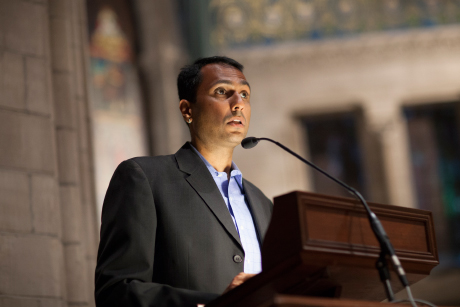Interfaith leadership key in diverse religious landscape

Eboo Patel speaks about the need for interfaith leadership and bridge-building during the Frederic C. Wood Lecture Sept. 9 in Sage Chapel. (Robert Barker/University Photography)
Sept. 11, 2014
By Rose Linehan
The population of the United States reflects a broader range of religious identities than ever before. From Christians to Muslims to Jews, fundamentalists to agnostics, the country is a mélange of beliefs. In such times, the key to a productive democracy is to encourage interfaith communication and cooperation, said Eboo Patel, an acclaimed interfaith leader who served on President Obama’s inaugural Advisory Council of Faith-Based and Neighborhood Partnerships.
Patel returned to Cornell to present the Frederic C. Wood Lecture Sept. 9 in Sage Chapel. The lecture also served to celebrate the 85th anniversary of Cornell United Religious Work, the first intentionally interfaith organization on a U.S. college campus.
Patel began with a depiction of the United States’ current religious landscape, which he described as “a polyglot mishmash hip-hop cypher of a nation,” where “identity is much more complicated than before, and [where] religion is much more flammable.” He said religious identity, while not enough to define an individual, is fundamental to the individual’s concepts of justice and morality. As such, religion is often inseparable from political views on contentious issues such as abortion and gay marriage.
A growing percentage of the U.S. population chooses “none” when asked to indicate a religious affiliation. Patel underscored the importance of including even these “nones” in interfaith dialogue, so that no one is marginalized. He said the only ground rule for interfaith dialogue should be that all parties enter into the discussion without hostility.
http://www.news.cornell.edu/stories/2014/09/interfaith-leadership-key-diverse-religious-landscape
